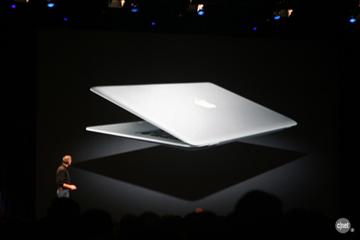Ultrabooks: Cheat Sheet

Don't believe the hype?
Ultrabooks? Is that some new class of best-seller novel?
Not even close. Ultrabooks are laptops - so they're books only in the 'notebooks-means-laptops' sense of word.
Oh, right. So Ultrabooks are a new kind of laptop?
Yes - or no, depending on your view. They are certainly laptops - but there is much debate about whether Ultrabooks are actually any different to 'normal' laptops, i.e. laptops not badged with the Ultrabook label.
So this is just another marketing buzzword then - like 'smartbooks', or dare I say it netbooks...
You could argue that, yes. Ultrabooks is a brand created by chipmaker Intel last year with the aim of putting the sexy back into PCs - the phwoar factor having been nabbed in recent years by tablets, and their lightweight smartphone OSes, not to mention Apple's so-thin-it-fits-in-an-envelop MacBook Air.

Steve Jobs unveiling the first MacBook Air, back in 2008Photo: Daniel Terdiman/CNET News.com
The Ultrabook label may be mostly marketing glitz but Intel claims Ultrabooks do offer something different - specifically it calls them a whole new category of PC which marries the laptop form-factor with a tablet's responsiveness and connectivity. So think fast boot times, a focus on connectivity, and battery life that will see you through the day - all factors the chipmaker reckons makes Ultrabooks a cut above common-or-garden laptops.
The other big focus is design: Ultrabooks are supposedly ultra-thin (less than 18mm thick) and light. So again, a bit like Apple's MacBook Air.
Over the years Apple's MacBooks have generally made PCs look about as attractive as a minibus at a supercar convention so Ultrabooks could be seen as Intel's attempt to create some Windows-based eyecandy.
Sounds like Ultrabooks are basically MacBooks for people who want a PC not a Mac?
Pretty much. Think thin, metallic, fancy looking. Or "Ultra sleek. Ultra responsive" as the Intel marketing bumf puts it. But of course, unlike the MacBook Air, Ultrabooks run Windows not OS X.
How fast can these Ultrabooks boot up then?
Intel claims it's a matter of seconds from hitting the on button to being fully operational which doesn't really tell us very much since anything can be measured in seconds so long as you have enough of them. Specific boot-up specs vary by make and model but as an example of what's on offer, Samsung's Series 5 Ultrabook claims to load from cold in 20 seconds, or wake from sleep in two seconds, while Lenovo's IdeaPad U300 claims to boot up in as little as 10.5 seconds.
What about their chips? Is there something different about the chipsets inside Ultrabooks?
Ultrabooks use Intel's second-generation ultra-low voltage Core i-series processors - so Intel Core i3, i5 or i7. These chips operate at low voltage and take up less real-estate, allowing the machines to have slender form factors, as well as to eke more out of their batteries. They also typically have solid state disks (SSD), rather than traditional hard drives, which helps to improve responsiveness.
The chips inside Ultrabooks may be low voltage but that doesn't necessarily mean low power: the i7 offers enough welly to act as most people's main PC - handling multitasking, video streaming and photo editing without complaint, which is more than can be said of a low-end netbook. But netbooks are a bit of a throwback to 2008/9 these days - they've largely been superseded by yet another branded laptop category, dubbed "ultraportables".
Examples of ultraportables include the - you guess it - Apple MacBook Air or a Sony Vaio (a range that's been around for years, incidentally). The power/performance difference between an ultraportable and an Ultrabook is, well, debateable since it depends on the specific models being compared.
So there's nothing that really makes Ultrabook distinct from lots of other laptops then?
Not really. Ultrabooks were originally touted as having a sub-$1,000 price-tag but while there are some sub-$1,000 Ultrabooks out there, there are also more pricey models, such as the Asus Zenbook UX or the Lenovo IdeaPad U300, both of which cost more than $1,000 - so defining an Ultrabook by price is tricky too.
What about screen size?
As with pretty much all other Ultrabook specs, there's a variety of screen sizes on offer, although big screens did seem to be the order of the day at this year's Consumer Electronics Show (CES) where screens as big as 14-inches were on show. However, as with the MacBook Air, there are 11-inch Ultrabooks in the wild so no one screen size defines an Ultrabook either.
I'm starting to think an Ultrabook shares some of the characteristics of vapourware...
There's definitely a lot more marketing style over substance here, yes. Laptops that are a bit sleeker, boot up a bit faster and have features built in to make connectivity a bit easier are just the PC market evolving generally.
Sure you can say that sleek, responsive hardware such as Apple's MacBook Air and the advent of media tablets such as the iPad have given PC makers an ultra kick up the backside. But that's obviously not something they'd want to shout about.